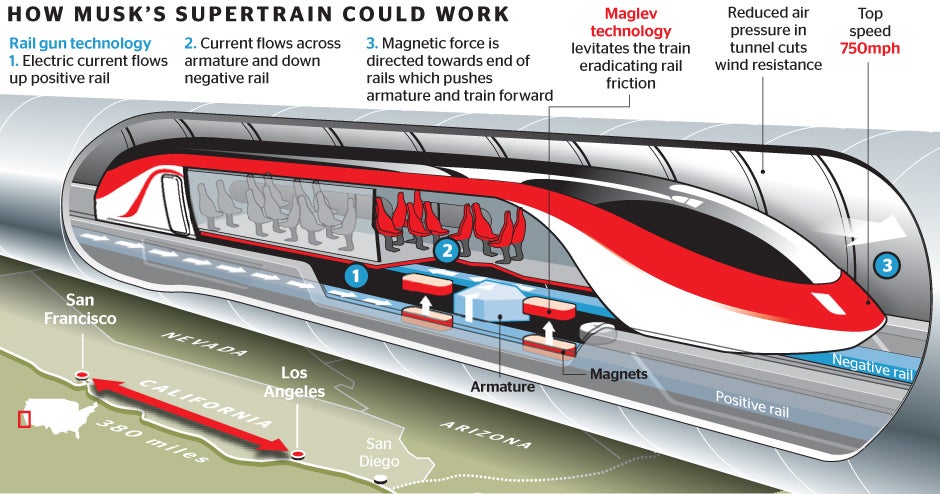
http://www.teslamotors.com/sites/default/files/blog_images/hyperloop-alpha.pdf
I love to travel. By that I mean that I love going to different places; getting there, however, can sometimes be less than enjoyable. I’ve had the best experiences taking high speed trains in Europe, especially on France’s TGV that can hit speeds in excess of 300 mph, because it’s a relatively cheap and quick option to get from point A to point B. While these trains are commonplace throughout Europe and places like Japan and China, the US is not as up to speed. If you want to get from, say, New York to Los Angeles, you’ll most likely be buying a plane ticket (unless you’re down for 41 hours of straight driving). While it is possible to get a train for that trip, you’ll be in for a three day journey with multiple stops. Of course, there is a glaring reason that the US doesn’t have the connectivity of other regions: the sheer geographical size of our country. But in the next few decades, we could looking at a revolutionary mode of long-distant transportation: the Hyperloop.
A longtime brain-child of SpaceX and Tesla Motors’ Elon Musk, the Hyperloop is a transportation system consisting of low-pressure above-ground tubes that will transport pods of people at speeds double the average gate-to-gate times of flights. In 2013 Musk published a 57 page concept outlining the “the initial route, preliminary design, and logistics of the Hyperloop transportation system” for a San Francisco to Los Angeles route that would take approximately 35 minutes (a 382 mile journey). While it would cost an estimated $6 billion for two 1-way tubes and 40 pods, Musk states that it could transport 7.4 million people a year, the costs would be amortized over 20 years and the average passenger would pay $20 per one-way ticket (compared to flights starting at around $150). While this is an exciting concept, the outline doesn’t specify the aerodynamic system under which the hyperloop would operate. Navigating to SpaceX.com/hyperloop reveals the following message:
“Neither SpaceX nor Elon Musk is affiliated with any Hyperloop companies. While we are not developing a commercial Hyperloop ourselves, we are interested in helping to accelerate development of a functional Hyperloop prototype.”
So I guess Elon Musk has a lot on his plate (never would’ve guessed). But rather than SpaceX sponsoring this endeavor, they’ve announced an “open competition, geared towards university students and independent engineering teams, to design and build the best Hyperloop pod”, and will construct a one-mile test track at their California headquarters in time for the competition weekend next June (by the way, if anyone is interested, the deadline for submitting an intent to compete form is September 15, so hurry up!).
An interesting development in the Hyperloop saga was announced Aug. 20, when it was announced that Hyperloop Transportation Technologies had signed agreements to work with Oerlikon Leybold Vacuum and engineering design firm Aecom, and said that it already has 400 team members from NASA, Boeing, SpaceX working on the project in their spare time in exchange for stock options. These companies getting involved indicates that what might have been considered Elon Musk’s pipe dream only a few years ago could be creeping closer and closer to reality.
What do you think? Could this be the future of transportation, or is the idea still too far-fetched?

http://observationdeck.kinja.com/elon-musk-looks-to-texas-for-hyperloop-deployment-1679785425

I have to agree with Jesse that the hyperloop sounds like a great idea. As mentioned in the post, I was in Europe this past summer and we traveled using the high speed train, which was very efficient. We took it from Belgium to Paris one day, and Germany and Amsterdam another. It made it possible for us to travel to all of these places in such a short amount of time. Implementing the hyperloop in the US would give those who travel another transportation method that may sometimes be the better option than say taking a flight. However, the cost is a big issue that seems to be up in the air. Musk seems to think it it will be surprisingly very cheap but others think maybe he’s being a little too optimistic. I found an article that talks more about the pricing of the hyperloop and even gives a visual on Elon Musk’s breakdown of the hyperloop costs.
http://www.washingtonpost.com/news/wonkblog/wp/2013/08/12/a-hyperloop-might-be-far-more-expensive-than-elon-musk-thinks/
I think that the hyperloop is a fantastic idea. The thought of super fast, super cheap travel is always good to people who don’t want to sit on a plane for hours. However, I recently read an article that outlined some of the criticisms of the hyperloop, and it made me think about some of the problems with the concept. You mentioned that there are super speed trains that travel all over Europe and parts of Asia. The hyperloop, at least the first portion, will only be from Los Angeles to San Francisco and that would cost an estimated $6 billion. The expense as you also mentioned would be amortized over 20 years. This may be something that was said by Elon Musk, and his only contribution to the hyperloop is the idea. Those who are actually going to engineer and construct the hyperloop may want to get a return on their investment earlier than 20 years. Those who actually own the hyperloop my just mark up the price and then it will be a faster form of travel, but not cheaper. After reading the article, which i will post the link to below, the whole idea of the hyperloop is too full of idealism for it to be rolled out exactly how Elon Musk had originally planned.
http://fortune.com/2015/09/11/is-elon-musks-hyperloop-fatally-flawed/